 The number of terms is greater by 1 than the exponent of the binomial. 2. The exponent of a in the first term is the same as the exponent of the binomial, and decreases by 1 in each succeeding term. The number of terms is greater by 1 than the exponent of the binomial. 2. The exponent of a in the first term is the same as the exponent of the binomial, and decreases by 1 in each succeeding term.  Elements of Algebra - Page 167by Arthur Schultze - 1918 - 309 pagesFull view Elements of Algebra - Page 167by Arthur Schultze - 1918 - 309 pagesFull view - About this book
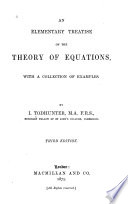 | Isaac Todhunter - Algebra - 1875 - 344 pages
...right-hand side is one more than the number of the simple factors which are multiplied together. II. The exponent of a; in the first term is the same as the number of the simple factors, and in the other terms each exponent is less than that of the preceding... | |
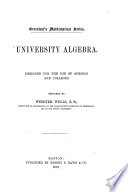 | Webster Wells - Algebra - 1879 - 468 pages
...+ 4 a ж3 + ж4 In these results we observe the following laws : 1. The number of terms is one more than the exponent of the binomial. 2. The exponent...same as the exponent of the binomial, and decreases by one in each succeeding term. 4. The coefficient of the first term is unity; and of the secm1d term,... | |
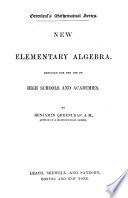 | Benjamin Greenleaf - Algebra - 1879 - 376 pages
...term is 5, or the same as the exponent of the power. Hence, 198. The exponent of the leading letter in the first, term is the same as the exponent of the power, and decreases by one in each successive term to the right. The exponent of the following letter... | |
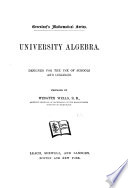 | Webster Wells - Algebra - 1880 - 498 pages
...+ 4 a ж' + of In these results we observe the following laws : 1. The number of terms is one more than the exponent of the binomial, 2. The exponent...a, in the first term is the same as the exponent of tJie binomial, and decreases by one in each succeeding term. 4 The coefficient of the first term is... | |
 | Mathematics - 1874 - 834 pages
...right hand side is greater by one than the exponent of (x + a) on the left hand. II. The exponent of x in the first term is the same as the exponent of the power to which (x -\- a) is raised, and in each succeeding term the exponent of x is less by unity... | |
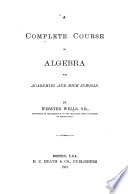 | Webster Wells - Algebra - 1885 - 372 pages
...observe the following laws : I. The numbef of terms is one more than the exponent of the binomial. . II. The exponent of a in the first term is the same as the exponent of the binomial, and decreases by 1 in each succeeding term. 1П. The exponent of b in the second term is 1 , and increases by 1 in... | |
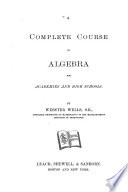 | Webster Wells - Algebra - 1885 - 370 pages
...observe the following laws : I. The number of terms is one more than the exponent of the binomial. II. The exponent of a in the first term is the same as the exponent of the binomial, and decreases by 1 in each succeeding term. III. The exponent of b in the second term is 1, and increases by 1 in... | |
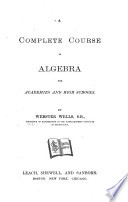 | Webster Wells - 1885 - 368 pages
...observe the following laws : I. The number of terms is one more than the exponent of the binomial. II. The exponent of a in the first term is the same as the exponent of the binomial, and decreases by 1 in each succeeding term. III. The exponent of b in the second term is 1, and increases by 1 in... | |
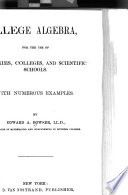 | Edward Albert Bowser - Algebra - 1888 - 868 pages
...the expansion of (a; + a)". In this expansion we observe the following RULE. ( 1 ) The exponent of x in the first term is the same as the exponent of the power, and decreases by unity in each succeeding term; the exponent of a begins with one in the second... | |
 | Algebra - 1888 - 492 pages
...of each succeeding term is found in the same manner from the term preceding. IV. The exponent of x in the first term is the same as the exponent of the power, and in each succeeding term it diminishes by 1. V. The exponent of y decreases from the end... | |
| |